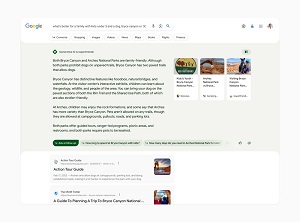News
AI Onslaught from Google Challenges Microsoft/OpenAI Hegemony
If there's one swath of IT turf Google needs to defend, it's search -- and search is quickly becoming usurped by chat.
Microsoft gained cloud-giant AI supremacy thanks to a $10 billion-plus investment in partner OpenAI, but Google is coming on fast thanks to a raft of announcements made at this week's Google I/O 2023 developer conference.
The corporate AI struggle is playing out most prominently in web search, the lifeblood of Google, whose name has literally become a common verb meaning "to search." If there's one swath of IT turf Google needs to defend, it's search -- and search is quickly becoming usurped by chat.
Last year's debut of OpenAI's sentient-sounding chatbot, ChatGPT, reportedly prompted Google to declare a "code red" to catch up in AI, which resulted in an "experiment" with its own generative AI chatbot called Bard, powered by a large language model (LLM) in the same way as Microsoft's "new Bing".
A comparison between Bing and Bard found the latter -- albeit an experiment designed to solicit feedback -- to be lacking in comparative functionality, perhaps rushed out the door too soon.
But now comes round two of the search wars, just a couple months later.
"With new breakthroughs in generative AI, we're again reimagining what a search engine can do," Google search exec Elizabeth Reid said in a May 10 announcement. "With this powerful new technology, we can unlock entirely new types of questions you never thought Search could answer, and transform the way information is organized, to help you sort through and make sense of what's out there."
Helping to do that is a new way to present search results. The new AI-powered search will generate a snapshot of key information to consider, providing links for users to dig deeper:
 [Click on image for larger view.] AI-Generated Search Snapshot (source: Google).
[Click on image for larger view.] AI-Generated Search Snapshot (source: Google).
The search makeover announced at Google I/O 2023, "Supercharging Search with generative AI," includes experiments, which are now accessible in the time-honored "labs" approach.
"Today we're sharing a look at our first steps in this new era of Search, and you'll be able to first try these generative AI capabilities in Search Labs, a new way to access early experiments in Search," Google said.
The company invited users to sign up on a waitlist to access Search Labs in order to get their hands on an early experiments in the coming weeks. Search Labs is available -- initially only in English -- on Chrome desktop and the Google App (Android and iOS) in the U.S. Coincidentally, while announcing that waitlist, Google at the same time removed the waitlist for Bard, making it instantly accessible to everyone.
Three early Search Labs experiments, which will be accessible for a limited time, include:
- SGE brings the power of generative AI directly into Google Search. The new Search experience helps you quickly find and make sense of information. As you search, you can get the gist of a topic with AI-powered overviews, pointers to explore more, and ways to naturally follow up.
- Code Tips harnesses the power of large language models to provide pointers for writing code faster and smarter. You can ask how-to-questions related to a specific set of programming languages (C, C++, Go, Java, JavaScript, Kotlin, Python, TypeScript), tools (Docker, Git, shells), and algorithms.
- Add to Sheets helps you insert a search result directly into a spreadsheet and share with friends. It's your perfect research companion for planning a trip and adding info to your itinerary, or keeping track of other information you've found on Search.
Beyond Search Labs experiments, other new features for search include image capabilities, app integration, coding enhancements and export actions. Users will be able to generate images based on prompts, or use Google Lens to analyze their own photos and get creative captions. They will also be able to integrate search with various Google apps and services, such as Gmail, Docs, Maps and others, just has Microsoft has done with many of its products and services.
What's more, search can integrate with external partners across a range of industries, including Adobe Firefly, Kayak, OpenTable, ZipRecruiter, Instacart, Wolfram and Khan Academy. For developers, search will offer more precise source citations, a dark theme and the ability to export and run code with Replit.
The company invited feedback from users to make search better and more useful for creativity, productivity and curiosity.
Much of the above functionality is delivered via PaLM 2, Google's new LLM. It's described as a state-of-the-art language model with improved multilingual, reasoning and coding capabilities, coming in four sizes: Gecko, Otter, Bison and Unicorn. Those are listed from smallest to biggest, so the lightweight Gecko is ideal for mobile devices.
Google said PaLM 2 is more heavily trained on multilingual text -- spanning more than 100 languages -- and can understand, generate and translate nuanced text across a wide variety of languages. It also reportedly demonstrates improved capabilities in logic, common sense reasoning and mathematics, as well as excelling at popular programming languages like Python and JavaScript.
 [Click on image for larger, animated GIF view.] Generative AI Search Prompting with Images in Animated Action (source: Google).
[Click on image for larger, animated GIF view.] Generative AI Search Prompting with Images in Animated Action (source: Google).
Speaking to PaLM 2's power and versatility, Google announced more than 25 new products and features powered by the new LLM. Those include Workspace features, Med-PaLM 2 for healthcare, Sec-PaLM for cybersecurity and Duet AI for Google Cloud, a generative AI collaborator designed to help users learn, build and operate faster.
And those 25 products and features represent only a small part of what Google announced at I/O, with the company listing "100 things we announced at I/O 2023."
To provide an idea of the scope and breadth of those announcements, following is a list of all that mention AI specifically (though many of the 100 announcements are related to AI but don't mention AI, for example, just mentioning "PaLM 2"). Also, note that many of the items in this list are detailed above:
- Google Meet on the Pixel Tablet uses Tensor's AI to automatically keep you in the center of the frame and adjust the lighting as you move around.
- Soon in Labs, you'll be able to try a new generative AI experience in Search in the U.S. (English only at launch), so we can incorporate your feedback and continue to improve the experience over time.
- A new generative AI shopping experience is built on Google's Shopping Graph. When searching for a product, you'll get a snapshot of noteworthy factors to consider, products that fit the bill, up-to-date reviews, ratings and prices and more.
- Over the last year, AI features in Workspace helped users write over 180 billion times.
- ... And that's just the beginning: We're embedding the power of generative AI across all the Workspace apps with Duet AI for Google Workspace.
- Gmail already uses AI to help you draft responses; now we're adding the ability to take your email thread context into consideration, and making it available on mobile.
- We're incorporating generative AI into Slides also, allowing you to easily create images from text descriptions.
- New Sheets AI tools can automate data classification and help you organize events and projects to track and analyze your data faster.
- Interested in these AI tools? We launched Workspace Labs so you can sign up to try these new features as a tested user. Sign up today.
- Our newest Project Starline prototype has a simpler design to easily fit into more spaces. This latest prototype uses a new AI technique we developed that only requires a few cameras to process high-quality 3D information. It's also smaller and more closely resembles a traditional video conferencing system.
- Universal Translator is an experimental AI video dubbing service that helps experts translate a speaker's voice and match their lip movements, which could hugely help learning comprehension.
- We announced a handful of improvements to and news about Bard, our experiment that lets you collaborate with generative AI — for instance, Dark theme!
- If you're lacking in the photo department, don't worry: Generative AI Wallpaper offers prompts that you can fill out, and Google's text-to-image diffusion model will generate unique wallpapers for you to choose from.
- We introduced our latest Safe Browsing API, which uses AI to identify and alert you to dangerous sites and files, stopping scams before they happen.
- Starting today, when you draft a Google Play store listing in English, you can use Google's Generative AI technology to help you get started. Just open our AI helper in Google Play Console, enter a couple of prompts, like an audience and a key theme, and it will generate a draft you can edit, discard or use.
With all of the recent blowback and backlash surrounding supposedly out-of-control AI advancements, Google also took the time to emphasize its "responsible approach" to AI.
"There are known limitations with generative AI and LLMs, and Search, even today, will not always get it right," Reid said. "We're taking a responsible and deliberate approach to bringing new generative AI capabilities to Search. We've trained these models to uphold Search's high bar for quality, and we will continue to make improvements over time. They rely on our hallmark systems that we've fine-tuned for decades, and we've also applied additional guardrails, like limiting the types of queries where these capabilities will appear.
"To evaluate the information for yourself, you can also expand your view to see how the response is corroborated, and click to go deeper."
About the Author
David Ramel is an editor and writer at Converge 360.